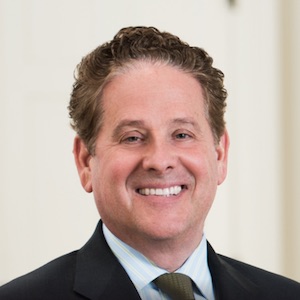
Andrei Iancu
Andrei Iancu is leaving an extremely lucrative position as Managing Partner at Irell to make his mark upon the patent system as Director for a salary that many in his wage bracket would consider a stipend. But his chance for significant policy impact is limited by time and the need to immediately deliver valid and timely patents on day one. Hopefully, Director Iancu is already planning some of his initiatives to get a jump start on his legacy.
It would help the system and immediately garner support from the IP community if Director Iancu could find a way to ensure that the funds provided by the users of the office are only used by the office. It seems like this would be a given since the USPTO is a fee-funded agency, but even after years of guarantees that the Office would have full access to what it collects, some of those funds have been siphoned off. The most recent example is the Department of Commerce appropriating funds for “shared services,” but since the USPTO has little use for many of these services, this is actually a way for the cash-strapped Commerce Department to dip into the USPTO coffers for enhancements they want. The problem for Director Iancu is that careerists at the Commerce Department are influencing the new agenda there and getting their hands out of USPTO pockets might rankle some powerful Department colleagues.
Another early initiative should be to limit the scope of the exclusion from patent subject matter eligibility as required by the Supreme Court decisions themselves. Those decisions are to be “narrowly construed,” but the breath of application by the lower courts has driven research in the affected industries of diagnostic methods, personalized medicine and computer-implemented process to more patent friendly shores. Updating the guidelines to reflect the Supreme Court’s stated narrow applicability of the holdings would go far to revitalize domestic research in these industries that are vital to our economic growth. The problem here is that Director Iancu will counter previous administrations who were pressured by the community that broadly disfavors patents. Resisting the voices emanating from those who were not historical users of the patent system is necessary for further job creation in the US.
Post grant procedures also deserve immediate attention, since just about everyone seems to be unhappy with them. Some have gone so far as to say that the procedures are irretrievably broken and should be abolished. But many of the problems with the board procedures could be fixed by rule changes initiated by the new Director. Standards for review and claim construction, the ability to amend claims, discovery scope, “gang tackling,” and many other issues need to be analyzed by the new Director and, where appropriate, fixed by changes in the rules. The original intent for the new procedures was to provide a faster and cheaper alternative to litigation, and if the rules are properly implemented, this can still be achieved.
Lastly, the new Director should immediately meet with the Patent Office Professional Association (POPA), the examiner union, and upper level management and design a plan to re-educate examiners whose statistics are not within the norms of their units. High-quality patents, along with enabling disclosures and clearly bounded claims, are the best way to ensure a patent system that stimulates economic growth and job creation. Most of the examiners are dedicated to their jobs and try to do the best they can, but statistics available to the public show that some churn rejections and never reach allowance. The USPTO must get ahead of the perception that they are not doing enough to address the problem and take some visible action.
Addressing the above problems will take Director a long way towards a successful tenure in his new position.

![[IPWatchdog Logo]](https://ipwatchdog.com/wp-content/themes/IPWatchdog%20-%202023/assets/images/temp/logo-small@2x.png)

![[Advertisement]](https://ipwatchdog.com/wp-content/uploads/2024/04/Patent-Litigation-Masters-2024-sidebar-early-bird-ends-Apr-21-last-chance-700x500-1.jpg)

![[Advertisement]](https://ipwatchdog.com/wp-content/uploads/2021/12/WEBINAR-336-x-280-px.png)
![[Advertisement]](https://ipwatchdog.com/wp-content/uploads/2021/12/2021-Patent-Practice-on-Demand-recorded-Feb-2021-336-x-280.jpg)
![[Advertisement]](https://ipwatchdog.com/wp-content/uploads/2021/12/Ad-4-The-Invent-Patent-System™.png)







Join the Discussion
13 comments so far.
staff
January 6, 2018 01:42 pm‘The original intent for the new procedures was to provide a faster and cheaper alternative to litigation, and if the rules are properly implemented, this can still be achieved.’
Sure, these post issue admin reviews are ‘faster and cheaper’…for large repeat infringers. To the contrary, we believe the large infringers who wrote that law never intended those proceedings as a way to better resolve patent disputes, but as a way to allow them to more easily rob and crush their small competitors. Either way, that is exactly what they have done.
All these proceedings do is offload all the expense of patent disputes onto those least able to afford them -inventors and other small businesses. They run up their expenses and delay justice until small competitors go bankrupt long before they can ever get to court to enforce their rights. It separates the haves from the have-nots. There is good reason why former CAFC chief judge Rader referred to these proceedings as ‘death squads killing property rights’. Any proceeding which denies or substantially reduces any American’s right to trial by jury must be abolished.
Still, we agree with you that director Iancu needs to filter out advice from large serial infringers (thieves) and those who work for or have close ties to them -no matter what industry, profession or sector. All they do is push more large infringer Chinese style propaganda. You can’t fix what was corrupt from the start. All post issue reviews must end.
Further, while we believe fee diversion is an issue and small entity fees in general, there are many issues we believe are far more important. A complete analysis on what we believe the most important issues are sequenced by their importance to inventors can be found at:
https://aminventorsforjustice.wordpress.com/ourposition/
For our position and the changes we advocate (the rest of the truth) to restore the patent system, or to join our effort, please visit us at https://aminventorsforjustice.wordpress.com/category/our-position/
or, contact us at [email protected]
Ron marchant
December 3, 2017 01:28 pmAlbert. So right.
angry dude
November 29, 2017 01:38 pmAlbert T Keyack@10
too little, loo late, dude
the trust is broken
Albert T Keyack
November 29, 2017 07:12 am“High-quality patents, along with enabling disclosures and clearly bounded claims, are the best way to ensure a patent system that stimulates economic growth and job creation.”
This should be repeated every morning by everyone involved in any way with patents.
Ron Marchant
November 28, 2017 09:08 amGood to read my old friend Bob. A number of thoughts. First, the anger stuff doesn’t help. Reform of patent law is not necessarily an evil. Laws do need changing sometimes to retune the inventor/society, monopoly/competition and requirements for “invention”. On Bob’s points I agree USPTO should have ownership of its fees. This is a necessary part of power to change. But it is not sufficient. There does need to be a financial regulatory regime to ensure the public gets value for money and office behaves responsibly. Second, it is important to look at post grant activities. All too often offices pay attention only to pre-grant. The extent of poets has to be agreed by stakeholders with the aim of simplifying procedures, reducing their costs, and reducing timescales. The latter matter to patented commercialising their inventions. Lastly, examiner performance. As an ex-examiner (perhaps even ex-everything) I know this is sensitive. It isn’t just statistics, it’s a failure to meet obligations to both inventors and public. Training, help etc all needed. But it needs to be made clear that continued under performance will have adverse effects too.
Anon
November 27, 2017 07:20 amangry dude,
Try understanding the Shakespeare quote in context.
Much like most of your rants, the meaning is NOT what you think it is. I “get” your anger, but you (continuously) let that anger cloud your critical thinking.
angry dude
November 26, 2017 09:01 pmI am already crying…
poor thing
first lawyers and manipulators like him destroyed 200 year old US patent system
now they are crying that some of them is underpaid ???
The fact that countless American inventors and startups went bankrupt in the last decade does not bother them at all
“The first thing we do, let’s kill all the lawyers”
(Shakespeare)
Anon
November 26, 2017 07:49 pmlost a sentence in the post above.
The sharing of power provided to the legislative branch may be undertaken, but must be explicit and limited. For example, Congress shares some of its power explicitly in 35 USC 283.
Such is clearly absent in 35 USC 101, and certainly is not shared with the Executive branch.
Ben
November 26, 2017 07:46 pm“plan to re-educate examiners whose statistics are not within the norms of their units. ”
So you want to reeducate the primaries in 3600 who regularily allow stuff?
Anon
November 26, 2017 07:16 pmEven then, Ron – they would fail for being of a substantive nature, of which they lack authority (see Tafas).
For the statutory law that is patent law, only one branch of the government has been allocated authority to make law (even – or perhaps, especially – as that one branch MAY share their power, but constraints on any such sharing exist, and I ammore than positive that those constraints are not in place).
Ron Katznelson
November 26, 2017 05:18 pmAnon @2,
I agree, Subject to the PTO’s limited power prescribed in 35 U.S.C. § 2(b)(2), the PTO’s 101 “guidelines” must be promulgated through Notice and Comment rule making per 5 USC § 553.
Anon
November 26, 2017 04:49 pm“Updating the PTO guidelines to appropriately reflect the narrow applicability of SCOTUS’ holdings on Section 101 is essential and should not be delayed.”
Per a recent CAFC decision, the “application” of what SCOTUS left with its “Gist/Abstract” sword is explicitly labeled “making common law.”
We have a major separation of powers issue with not only the judicial branch writing statutory law, but the executive branch as well.
Ron Katznelson
November 26, 2017 03:27 pmThank you Bob for being spot-on!
You have flagged the major areas in which the Office needs a shot in the arm, or substantial course correction and cures from current infirmities.
Currently “fee-diversion” is taken to a new height – it is perpetrated by the executive agency, not by Congress. And the agency charges fees to “build” an arbitrary-sized “reserve” without Congressional authorization and appropriation. See http://bit.ly/PTO-fees-per-AIA-PtI . This must stop and new rules that do not violate, but comply with, Section 10 of the AIA should be promulgated.
Updating the PTO guidelines to appropriately reflect the narrow applicability of SCOTUS’ holdings on Section 101 is essential and should not be delayed.
Major overhaul of the post issuance review rules as stated above is critical, especially if the Court’s Oil States decision upholds its constitutionality.
Focus on examination quality – not merely on patent quality. Patents are not the problem – examination is. Examination errors of both types must be minimized and the Office must cease churning rejections that never reach allowance.